Manolo Quezon is #TheExplainer Newsletter - Issue #18 (Tandemocracy edition!)
We have a new vocabulary word for this week, folks: tandemocracy.
Aside from that, coalition-building's the name of the game.
Electoral Merry-Go-Round
The spoils were supposed to go to PDP-Laban, the President's party and thus first among equals in the ruling coalition. But it's factions have been quarrelsome and it's old-time members have been edged out with the influx of new recruits. Koko Pimentel lost the Senate presidency, Pantaleon Alvarez was ousted from the House speakership; and now, by all accounts, Manny Pacquiao is due to be kicked out of the party presidency he holds.
Where the party, like all ruling parties that came before, matters is that it's the nominal affiliation of most of the country's governors and mayors going into the 2022 polls. This, plus the presidency's control over the national coffers, is what's considered "machinery" going into an election, except at the end of a president's term, that machinery counts for less as officials prepare to realign depending on the election's results.
What is supposed to be different this time around, is the President's supposed record-high popularity and the absence of any real opposition.
Be that as it may, the Electoral Merry-Go-Round features intramural fighting in PDP-Laban; as I mentioned before, it seems to me the Nationalist People's Coalition is the likely destination of Pacquiao if he gets expelled from PDP-Laban.
July 4-5:
As he departs for fight training, Senator Pacquiao leaves some exposés as a parting gift for the President (who will later take a pot-shot of his own: reviving the tax-evasion case against Pacquiao); pro-administration radio including the Iglesia ni Cristo, continue attacks on Pacquiao; the President's daughter says she "may" not run for president if her father runs for veep.
July 6-7:
On July 6, a bandwagon for the President's daughter is projected by means of a cascade of announcements: Lakas-CMD, Puwersa ng Masa, People's Reform Party, National Unity Party, all signal interest in a coalition with Hugpong ng Pagbababago; a day later, talks with the Nacionalista Party is also mentioned.
On the same day, a meeting is held between officials of the PDP-Laban, members of the Cabinet, and the President, but it won't be publicized until the next day, July 7. Then, the President dominates the news cycle, with his accepting running for vice-president in principle, says he opposes his daughter running for president, while floating the name of Senator Go as his preferred presidential candidate.
July 8-11:
A "consciousness-raising" (see political calendar) tour of Luzon by Senators Panflio Lacson and Vicente Sotto III kicks off with a trial-ballooned theme ("Singapore vision" and an "improved" anti-drug campaign)
On July 9, the Pimentel-Pacquiao wing of the PDP-Laban formally expel party Vice Chairman and Energy Secretary Alfonso Cusi, Deputy Secretary General Melvin Matibag and Membership Committee Head Astra Naik, partly on the basis of promoting a non-party member, Sara Duterte, as potential presidential candidate.
The President's daughter, for her part, reporting to "news" of the bandwagon of parties open to supporting a presidential bid for her, announces she is "open" to the idea of running for the presidency.
On July 10, former Constitutional Commission member Christian Monsod says the President's running for vice president is a backdoor plot to reclaim the presidency.
On July 10-11, the expelled officials, in turn, refuse to accept the validity of their expulsion --vowing to expel, in turn, Pacquiao from the party presidency this week. Pastor Quiboloy weighs in saying the party is nothing without the President.
Tandemocracy: All in the Family Alert
An observer first posited the possibility of a daughter-father informal tandem back in June; I was skeptical until now. Now I believe it has to at least be considered. While the President and his daughter are remarkably like President Marcos and his daughter Irene --famously at odds from time to time-- in the end, they will be loyal to each other. So the only question is, with the need for the President to ensure a reliable successor, how is this best done? In the end a non-family member won't do as a successor to the presidency. Then the only remaining question is, will the President need to seek office to ensure this, or will he only flirt with the idea, to remain relevant as long as possible, postponing his eventually becoming a lame duck?
Here, the possibility of keeping a lock on the voter base by running independently of each other, makes sense.
tandemocracy - Wiktionary Blend of tandem + democracy, a calque of Russian тандемократия (tandemokratija) originally in reference to the office-trading of Vladimir Putin and Dmitri Medvedev.


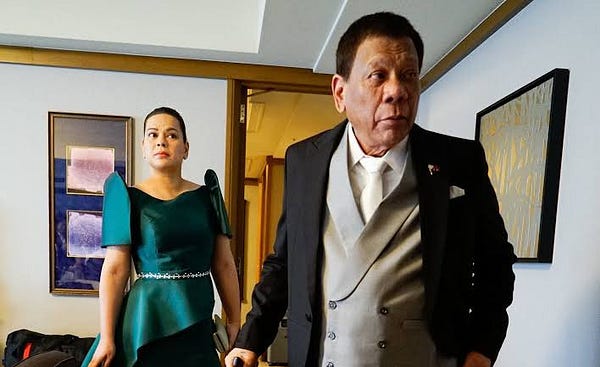
Additional Readings: "Tandemocracy"
Russians and the Putin-Medvedev "Tandemocracy": A Survey
What did Russians expect and want during the 2007–08 election cycle that produced the current “tandemocracy”, joint rule by Dmitry Medvedev (as president) and Vladimir Putin (as prime minister)? The 2008 wave of the long-running Russian Election Studies (RES) series of surveys sheds light on this question. Russians supported the United Russia Party and subsequently Medvedev in significant part because they pledged to persevere with the course set by Putin, and there is compelling evidence that citizens did not do so blindly and that Medvedev’s and United Russia’s policy stands are meaningful parts of the story. In fact, more Russians than not hoped that sooner or later it would be Medvedev rather than Putin at the helm of Russia’s ship of state, though they did not generally expect this to occur. Because the Russian leadership has not yet dared to run roughshod over public opinion, close monitoring of the public mood may provide important clues as to how Russia will behave—and how far it will go to challenge Western ideals and norms—at home and abroad.
Tandemocracy in Today’s Russia By Andrei Ryabov, Moscow
Six months have passed since a new system of power began to function in Russia, one in which there are two practically equal centers for making decisions in the persons of President Dmitry Medvedev and Prime Minister Vladimir Putin. Th is system has been described in various ways: “diarchy,” “dualism,” “duumvirate,” and “bi-centered.” More recently, observers have begun to describe the system as a “tandemocracy.” Th is latter term has been gaining popularity for two reasons. First, traditionally in Russian, when you use the terms “diarchy,” “dualism” or “bi-centered,” you a priori have in mind competition between two centers of power, even if only within a limited context. Th e term “duumvirate” derives from classical history and is understood as something born of circumstances and therefore unstable. In this sense, the concept of “tandemocracy” is a useful counterpoint since it emphasizes cooperation between the two centers of power. Today, this concept is a better description of reality, since until now the system for making decisions, at least in the public sphere, strives for coordination between the two centers of power. Th is approach is particularly obvious in foreign policy. While individual specialists have been able to discern some differences in the positions of Medvedev and Putin, in practice, their actions are well coordinated and it is difficult to see any difference in their international approaches. In domestic policy, Medvedev and Putin have publicly disagreed only on rare occasions and analysts have to work hard to fi nd these cases. Second, typically the Russian literature uses the first four terms to describe systems in which the two centers of power are based on constitutional and other legal norms or official agreements. But the existing configuration of power is based only on the personal agreement between the president and the prime minister. Making the transition from the presidential monocentrism to the Medvedev-Putin tandem does not require amending the constitution or revising any constitutional laws, such as the law on the Russian government. Based on these considerations, we will use the term “tandemocracy” to describe the new configuration of power in Russia...
Whatever His Title, He Plans to Remain in Charge: Is it a Solo ‘Tandemocracy’ Now? | Al Jazeera Center for Studies — studies.aljazeera.net
One possibility that appears to be unlikely is that Putin will become president for a fifth term. Not only would the new stricter term limits on the presidency rule this out, but the fact that the presidency will be a weaker position than it has been up to now suggests that it would not be of interest to Putin. On the other hand, there has been speculation that Putin will “restart the clock” in 2024 on the absolute limit of two terms as president, thus enabling him to stay on until 2036.
Another possibility which observers have discussed is through Putin becoming chair of the more powerful State Council that he has proposed. This position would free him from day-to-day governing, but allow him to retain a veto over any policy he disapproved of being pursued by the president or prime minister—much in the way that Nursultan Nazarbayev is believed to exercise control in Kazakhstan through remaining chairman of the Security Council and being designated “Leader of the Nation” after he stepped as president in 2019.
What is confusing about Putin’s constitutional changes, though, is that the Russian president, despite being weakened, is supposed to appoint the members of the State Council. Perhaps, though, Putin plans to make these appointments himself before he steps down, or feels confident that whoever the next president is will make the appointments Putin wants him to make. Less clear is how long the chair and members of the State Council will be appointed for, and how or even whether they can be removed from office.
Another possibility still is that Putin can follow the precedent he set in 2008 of becoming prime minister once again after leaving the presidency. Indeed, with the new constitutional amendment, Putin becoming prime minister could put him in a constitutionally stronger position than he was while serving in this position in 2008-12. Back then, President Medvedev appointed him as prime minister and had the right to dismiss him at any time (even though Medvedev could probably not have even tried to do so and survived). With the Russian prime minister now to be appointed by the Duma, Putin can remain prime minister as long as he controls a majority in it. And this is something he may be able to do indefinitely, as there is no term limit on the prime ministership.
Finally, there is the possibility that Putin could remain the ultimate arbiter of Russian politics without holding any official post; much like Deng Xiao-ping did in China in his later years. After serving as Russia’s top leader for so long, Putin may well now be in a position where he can successfully do this since the personnel in the system he has created are more loyal to him than to anyone whom he allows to become president or prime minister.
Situationer: PDP-Laban locally
According to PCIIJ's 2019 midterm Data analysis of votes, voters, and winners:
The May 2019 elections established the formidable hold on local power of the Partido Demokratiko Pilipino-Lakas ng Bayan or PDP-Laban party of President Rodrigo R. Duterte. The Nacionalista Party (NP), Nationalist People’s Coalition (NPC), and National Unity Party (NUP) that are also allied with the PDP-Laban also bagged significant numbers of winning candidates for governor and mayor. The opposition Liberal Party and other smaller parties seem to have been shut out or had gone ghosting in May 2019.
In more than half or 41 of the nation’s 81 provinces, the winning candidates for governor ran under the PDP-Laban party. At least one governor in each of the regions of the country ran and won under the PDP-Laban banner in May 2019.
The National Unity Party (NUP) placed second in terms of number of winning candidates for governor. Nine other winning candidates are affiliated with NUP, followed by eight from with the Nacionalista Party (NP), and seven with the Nationalist People’s Coalition (NPC).
Of the 1,634 winning candidates for mayor, one in three or 605 (37 percent) ran under the PDP-LABAN party. A far second is the Nacionalista Party, which fielded 240 (14.7 percent) candidates for mayor who won. The Nationalist People’s Coalition (NPC) and National Unity Party (NUP) had 173 (10.6 percent) and 138 (8.4 percent) winning candidates for mayor.
Additional Readings:
I'm not so convinced this is actually illuminating, but it's an interesting undertaking.

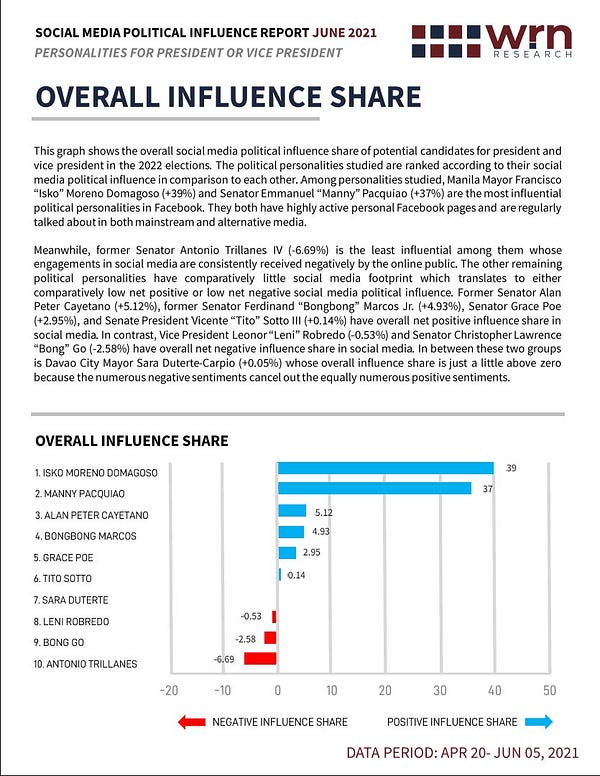
On a semi-related note, interesting research:
Architects of Networked Disinformation | by D&S Media Manipulation: Dispatches from the Field | Medium — medium.com
Architects of Networked Disinformation: Behind the Scenes of Troll Accounts and Fake News Production in the Philippines is an 82-page report based on one year of interviews and observation of the high-level strategists and digital support workers behind fake news and “digital black ops.” This report results from a British Council-funded ethnographic project that gained unprecedented access to the shadow industry of political trolling in the Philippines. Authors Jonathan Corpus Ong and Jason Cabanes mapped out a professionalized hierarchy of digital operators that hides in plain sight — individuals they call “architects of networked disinformation.”
A note on the political engagement of College graduates
From an interesting Twitter thread on "PIDS' research on the 4th Graduate Tracer Survey (GTS), which collected data on college experience - skills learned and quality of instruction - and how it relates to employability, citizenship, satisfaction." Tweet with data below ties in with something Randy David pointed out years ago, only around 10% of Filipinos have ever taken part in s protest or rally; but a huge percentage have indulged in civic disobedience of some sort. Also, findings that only 10% of Filipinos believe in political parties. As an aside, these, like our preferred method of murder —poison—suggests we’re passive aggressive.

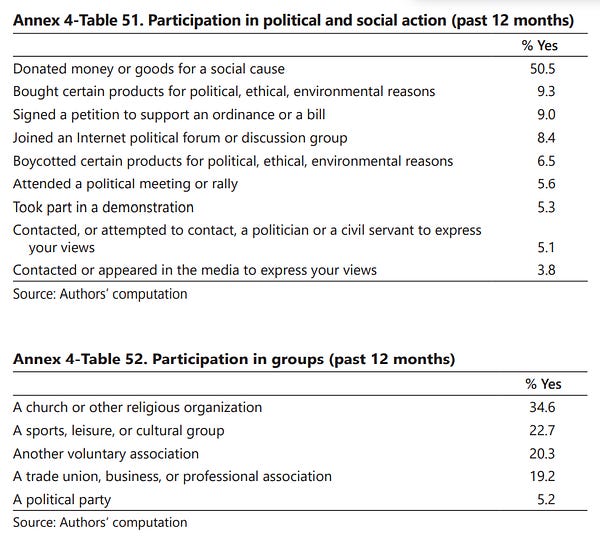

Interesting demographic trends from the most recent census.

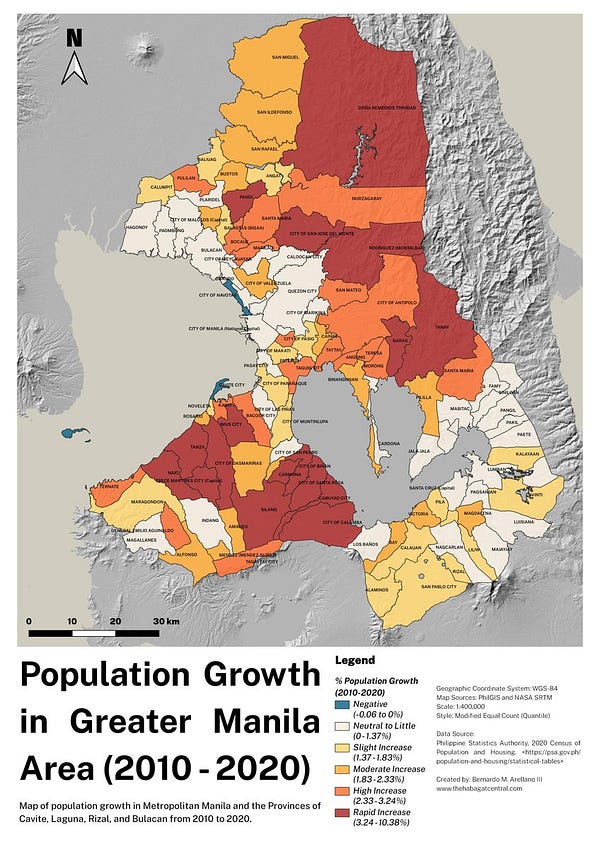

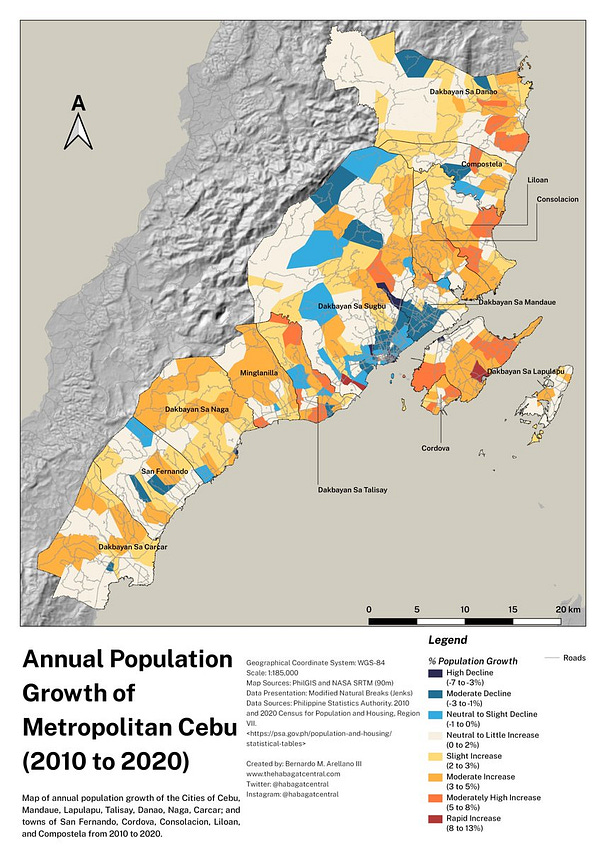
Trivia

Thank you!
Your subscribing to this newsletter helps keep up my productivity and for those of you giving of yourselves to help through Patreon, it also makes a big difference to writing morale. As it’s been evolving this newsletter helps me flesh out my ideas, which then get distilled into my column, which then provides at launching pad for expanding those ideas, and so on.
Thank you to those who are contributing to Patreon and thus helping provide the resources required to keep producing this newsletter and podcast.
Consul: Abigail Salta
Praetors: Carlos v. Jugo, Ramon Rufino, Arbet Bernardo
Aediles: Jeric Peña, Steven Rood, Willi
Quaestors: Joseph Planta, Giancarlo Angulo, Annie Inojo
Their support enables me to devote the time and effort for this newsletter and my podcast. Thank you!




